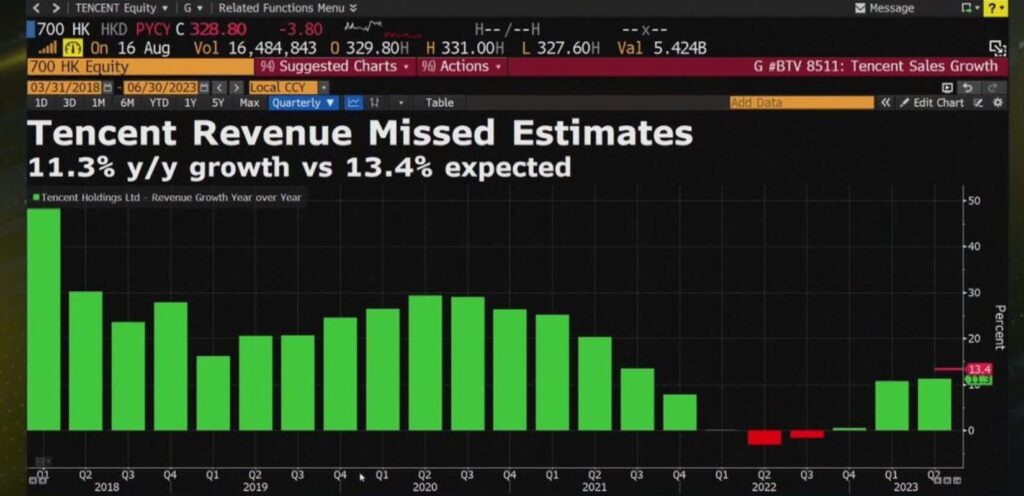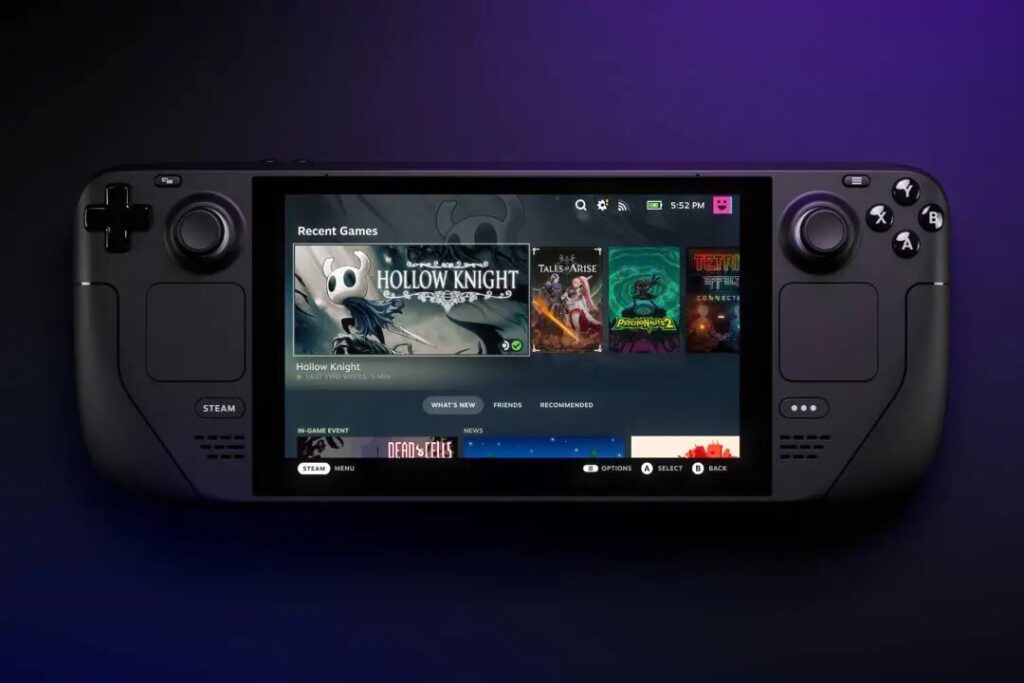LinkedIn Launches 3 Logic Puzzle Games to Boost User Engagement on its Networking Platform

I am a law graduate from NLU Lucknow. I have a flair for creative writing and hence in my free time work as a freelance content writer.

I am a law graduate from NLU Lucknow. I have a flair for creative writing and hence in my free time work as a freelance content writer.

I am a student pursuing my bachelor’s in information technology. I have a interest in writing so, I am working a freelance content writer because I enjoy writing. I also write poetries. I believe in the quote by anne frank “paper has more patience than person
As a struggling economy hampered Tencent Holdings’ recuperation from the year’s record-breaking fall, revenue growth was lower than anticipated in the second quarter. Tencent Holdings is a Chinese social networking and gaming behemoth.

The expansion of Tencent’s primary gaming division was less robust than anticipated in the January through June period. With fluctuations in currencies removed, domestic gaming income remained stable at 31.8 billion yuan whereas overseas revenue from gaming increased 12 per cent to 12.7 billion yuan.
James Mitchell, the business’s chief strategy officer, explained why the business decided to momentarily launch less socially impacting material in its second fiscal quarter as the cause of the video game industry’s poor growth during a conference call with investors.
The owner of the WeChat texting network and the biggest video gaming firm in the world, according to industry observers, is now facing intense rivalry from its rivals. According to an analyst at Blue Lotus Capital Advisors, Shawn Yang, although Tencent’s fresh releases are up against fierce competition from other game developers like NetEase Inc. as well as miHoYo, its older blockbuster titles have provided subpar revenues owing to a lack of material.
In the three months ending June 30, profit increased 11 per cent to 149.20 billion yuan which is approx $20.45 billion, falling short of the 151.73 billion yuan mean forecast of 21 analysts surveyed by Refinitiv. Little altered from the 10.7 per cent increase in the first quarter, the rise in revenue was stable.
Due to Beijing’s regulatory repression on the internet industry, Tencent reported its very first sales fall during the same period last year, which resulted in a decrease of one per cent in revenue.
Also Read: X to Get Rid of Ability to Block Accounts, Owner Elon Musk Says
For China’s internet behemoths, like Tencent, regulatory anxiety has decreased this year as a result of Chinese officials’ desire to increase private sector trust. However, the world’s second-biggest economy has not grown since late last year, when COVID-19 limits were eased. In comparison to the same time in the previous year, net profit increased 41 per cent to 26.17 billion yuan. However, it was below the average expert expectation of 33.41 billion yuan.
One of the positive aspects was the income that came from web advertisements. As demand for its clip-sharing service similar to TikTok, Video Accounts expanded, jumped 34 per cent to 25 billion yuan. According to the firm, growth in both offline as well as online payment operations was the reason for the fifteen per cent rise in earnings from financial technology and business offerings to 48.6 billion yuan.

I am a student pursuing my bachelor’s in information technology. I have a interest in writing so, I am working a freelance content writer because I enjoy writing. I also write poetries. I believe in the quote by anne frank “paper has more patience than person
Players can now use Steam Deck to wirelessly transfer games from their Desktops to their mobile Valve gaming consoles.
Because of this, consumers can effectively use less internet by not having to download their PC gaming software again from their Steam Deck. Not to mention that for people with horribly jerky internet connections, the game transfer choice should be speedier.

According to Engadget, this new Steam Deck ability changes everything if a gamer’s internet connection is too slow or has a limited amount of bandwidth. Recently, Valve added a new feature to Steam Deck that let players share games across their local networks.
Also Read: Why suddenly are Twitter feeds flooded with Elon Musk’s tweets?
They can transfer a file from their Desktop to their portable gaming system without accessing the internet thanks to it. According to the gaming company, “Local Network Game Transfers are great for Steam Deck owners, multi-user Steam households, dorms, LAN parties, etc.”
You must first enable Steam’s beta on your PC’s Steam client and Deck in order to access the feature. Choose the game you want to add to your Deck from there, and Steam will check every PC connected to your network to see if it already has the game.
Steam will start the game transfer procedure if it discovers one. It’s important to note that this feature works with computers connected to the same network, thus you are free to move installed Steam games from any other computers in your home to your PC. On its help page, Steam provides more information about how everything functions.
It also states that it will download the remaining portions of the game from its servers in the event that the devices lose connectivity during the transfer process “or no more content is available.” Also, users can change the parameters that control which Desktops your Steam Deck may download from.
Users can only transfer games from the devices they’ve connected into Steam, therefore Steam by default has it set to “Only my own devices.” But, users may change this setting to “Only my friends” or “Any user” if they wish to download games from a friend’s or relative’s Computer. Unfortunately, Steam does not yet enable game transfers coming from PCs using Big Picture mode or the Steam Deck.
Also Read: iPhone 15 and 15 Plus to get redesigned camera. What to expect?
The Valve Corporation created the Steam Deck, a portable gaming device. It which debuts on February 25, 2022, is a device that functions similarly to the Nintendo Switch and may be played handheld or when hooked up to a monitor.
It is an x86-64-v3 device that runs SteamOS and has built-in gaming inputs for playing the entire Steam library, supporting Windows PC games using the Linux-based Proton portability layer. The system is an open framework that allows users to install suitable non-Steam software, including operating systems, games, and applications.

I am a law graduate from NLU Lucknow. I have a flair for creative writing and hence in my free time work as a freelance content writer.
When you are starting something way out of your league, patience is a very important factor. A part of our young generation is going to be future entrepreneurs. And, they are expected to accept failure and be optimistic at every moment of life. The entrepreneurial journey is not a bed of roses especially for those going unorthodox. Our society is not a huge fan of gaming. Building a career revolving around gaming is a far-fetched dream. But, Trip Hawkins proved that one can excel in any field if the person is dedicated to it. Trip Hawkins is the owner of more than one gaming company. But, he became famous all over the world for founding Electronic Arts.
Born and brought up in a small of California, Trip Hawkins had a very bright and creative childhood. Both of his parents were equally artistic. Though his father was a part of the growing electronics industry, he later delved into becoming an artist. His mother was a great musician and also wrote poems. Maybe the creative family background of Trip gave him the idea of designing everything of his own.

It was in the 1960s when Trip started playing simulation board games. He played many games but his favorite one was Strat-O-Matic. He became addicted to the game and more than that he was keen about how it is working. The designing part intrigued him and led him to build his own game of a similar type. It was in 1973 that he builds the gaming but failed to sell enough copies of it.
But, this was the eye-opening moment of his life. He was in school using computers like every other kid but in a more advanced way. He really enjoyed the entrepreneurial side of his life. Though he failed in the first try, he made up his mind.
It was in the 1970s when Trip was working with computers, coding and game development in a full-fledged way. This was the time when microprocessors for the first time invaded the electronics market. So, this gave Trip the idea of doing thorough research on market demand.
Before launching his own company, Trip studied how many people are having internet access, the rate of public demand and how long it will be there.
Before founding Electronic Arts, Trip worked at Apple. But, his planning didn’t stop and it took him eleven years for implementing it. The trip also went to Harvard University and there he designed his own course for studying game theory. The trip also did an MBA because he was interested in the business market equally. But, he noticed nobody in Apple wasn’t really a gaming enthusiast.
A gaming Pro with a business degree thus left Apple after working for four years. But, Trip admits that working closely with Steve Jobs helped him a lot in building his own empire.
In January 1982, Trip approached Don Valentine, a Silicon Valley Venture Capitalist. He offered Trip office space and he finally accepted it. When Trip established the company he named it Amazin’ Software which was later renamed Electronic Arts. When Trip founded the company he invested $200,000 from his own pocket.
Electronic Arts are headquartered in Redwood City, California. Today, it is known as the second-largest gaming company in the American and European markets in terms of revenue and market capitalization. In 2018, the company’s annual revenue summed up to $5.15 billion. There are almost 9,000 employees working for the company.
In 1991, Trip formed 3DO, a video game console company. After a couple of years, it became the most powerful video game console. In 1996, 3DO became a video game developer but it went out of business in 2003.
But, Trip didn’t give up that easily. In late 2003, he came up with a new video game development company, Digital Chocolate. In 2012, Trip resigned from the company and joined the board of directors of Extreme Reality.
In 2005, Trip became the eighth person to get enrolled in the Academy of Interactive Arts and Science Hall of Fame.

Annasha Dey is an NIT student, who apart from studying engineering is also a content writer. She has a great interest in photography, writing, reading novels, and travelling as well. She is a foodie who loves socializing and hanging out with her friends. She is also a trained Kathak dancer and a big fashion enthusiast. Dey also loves watching TV series, which includes F.R.I.E.N.D.S. and Big Bang Theory. To be a better writer she prefers to read more
It is inevitable that games are an enormously great way to pass the time and for the recreation of mind, be it offline (real-world) or online (virtual). But since the recent years, the ‘gaming’ (virtual) industry has been putting up a lot of effort to provide the best experience, and with the games that have been rolling out, it is hard to not let the spotlight fall on them. According to IAB (Trends -2016), mobile gaming will be the one to have more than 190+ million users which clearly tells the addictiveness of the games. One such creator of ‘addictive’ games is King.com (King) which is playing a major role in providing the world what it desires. The co-founder and the Chief Creative Officer of King, “Sebastian Knutsson” shares a story of his failures and successes, and how creativity can shake the world.
King.com was founded by Riccardo Zacconi, Toby Rowland, Sebastian Knutsson, Thomas Hartwig, Lars Markgren and Patrik Stymne, in 2003, in Sweden. Zacconi and Toby, after the selling of udate.com, joined four of the co-founders to start a new venture with the help of investments of Angel Investments which were provided by Melvyn Morris.

The company started with Morris as chairman, Zacconi and Rowland as co-CEOs, Sebastian Knutsson as CCO (Chief Creative Officer), CTO Thomas Hartwig, Managing Director Lars Markgren and Chief Systems Architect Patrik Stymne. All but Rowland are still with the company.
King, initially, focused on the production of web browser compatible games but the company nearly went bankrupt, as it generated no profit. A key investment that saved the company arrived just a day before the doom-day by Melvyn Morris. Within two years, the company started generating revenues with them, growing from $2.60 million in 2004 to $12.21 million in 2004. In 2005, Apax invested a massive $32.68 million with Index Ventures invested $5.65 million. “We became dominant in Europe” quoted Knutsson on the achievement of King.
Knutsson, in the company, is referred to as ‘the gamer guy’ and is the key man which designs games for King. He has been with the company since the very beginning with being at the CCO post, since June 2004. He also served as the Executive Product Developer from February 2003 to June 2004. He had done his BA from Stockholm School of Economics, which enables him to have a sharp business brain. He also co-founded ‘Spray’ which became the main link between Zacconi and him. Alongside Spray and King, he founded Fjord Network AB and Midasplayer.com Ltd. He currently is an investment committee member at Sweet Capital.
It was in 2009 when King again saw a downfall in its users’ count. It was because Facebook started to suck up their lot of users with the interactive games it brought up. “In 2009 and 2010, the growth was stagnant. We had this term when we were talking about our partners, as being ‘F by F’” said Sebastian, mocking their situation back in the day.
In October 2010, the company was revised and shook up the whole system within. The company wanted to integrate with Facebook. The web team was slashed in half, releasing coders to work on five new projects to crack Facebook.
Knutsson was the lead to all this. “We knew we had to manage the transition with improving the communication internally, managing that risk of trying to pivot and make sure the staff were part of that journey and understanding why we are doing it,” he added. Out of five games, one game was in vain, three did okay, and one did all the work that was required. These ‘saga’ games required very little of time investments, unlike the Zynga games. This, turned out to be very successful for the company, as the game ‘Bubble Witch Saga’ managed to gain more than 10 million players and became one of the most played games on Facebook. Their next release, which emerged from the Stockholm Studio of Knutsson, Candy Crush Saga topped the Charts, be it the Facebook or the play store. The game was all over, and this helped King in their IPO.
Knutsson refers to the ‘Saga’ concept as a very simple one. “It is the simplicity that is the strength, not its complexity.” “Candy Crush was our strongest game on Facebook; we knew we had to get it right.” Candy Crush and its Saga proved to be a gem for King as the game was played by more than 93 million people, more than a billion times daily in December.
As of now, King has 13 studios in different locations, is generating revenue of US $1.59 billion, net income of US $575 million (2014). Company’s valuation at IPO is 7.1 Billion. Sebastian owns more than 17 million shares of the company. (Third most in the company)
The life story of Sebastian Knutsson, the co-founder and Chief Executive Officer of King.com, clearly shows that creativity never lets you down. He claims to have designed 10 out of the company’s 15 worst games ever but still leads the company to the best.

Raghav is a student and a content writer. He loves to write about emerging as well as the existing technologies around and about the ones who bring them to you. Music is the other passion that Raghav processes. It is like the fuel to his body. He is also in writing songs and poems. He believes that life is short, so live the best out of what you have got. Raghav considers himself a sci-fi guy, having stories and tech all around in his head, all the time.